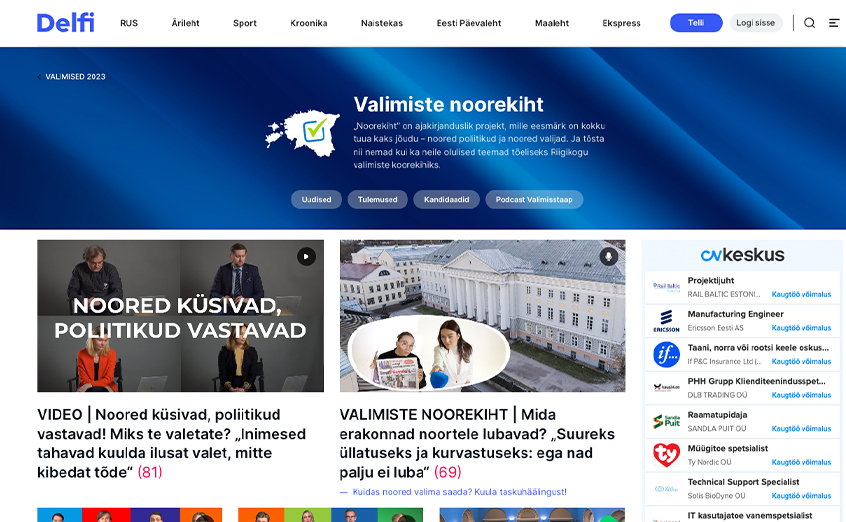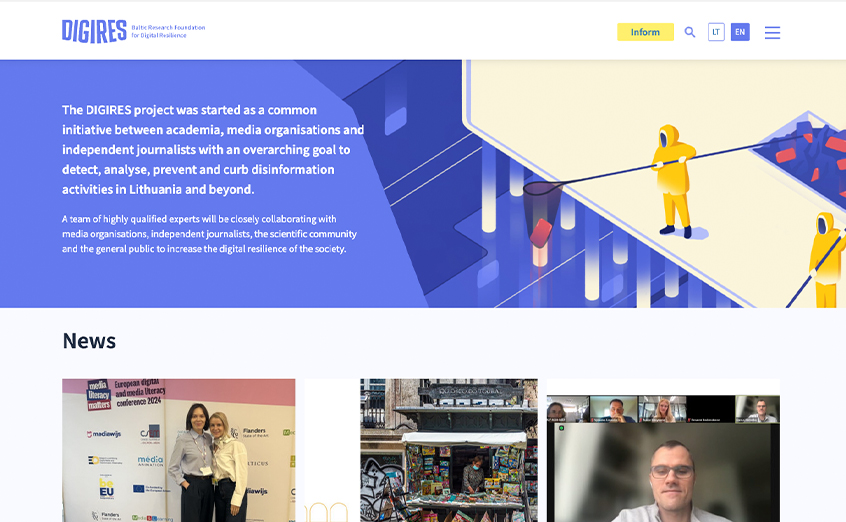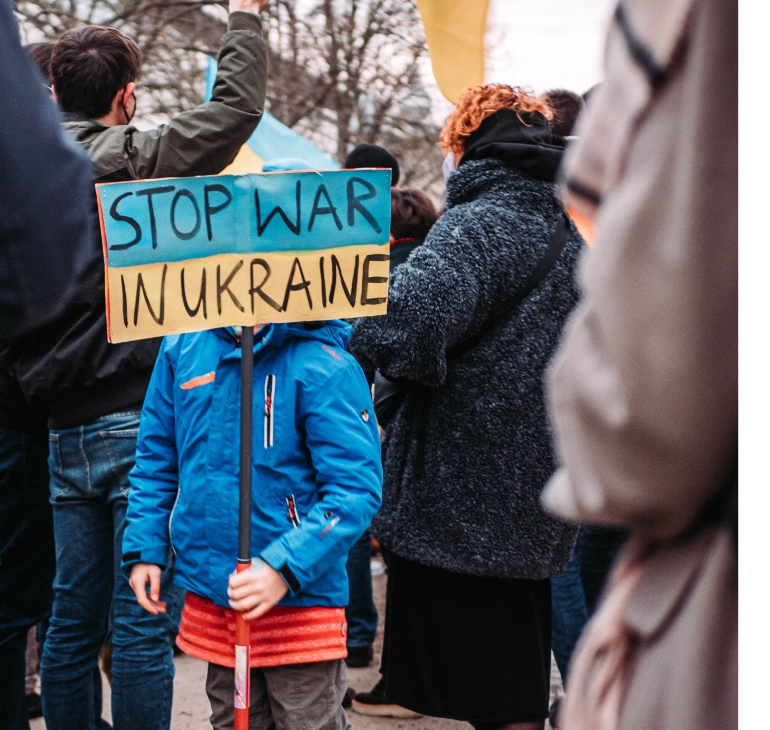
ESG strategy
Ekspress Grupp is the leading media group in the Baltic countries and therefore plays an important role in the development of the society. The Group’s media publications significantly shape the public information space in all its three home markets, i.e. Estonia, Latvia and Lithuania. As an employer of a considerable size, the Group has an obligation to manage all Group enterprises in an ethical and responsible manner, and to create independent, professional and reliable media content.
We ensure such activities based on the group-wide ESG (environmental-social-governance) strategy created in 2022.
We are actively seeking opportunities to create a positive impact on the society through the core activities of Group companies. We are adhering to the international principles of responsible enterprise to ensure that our operations and business strategy do not infringe the rights or wellbeing of any stakeholder groups. In addition, we wish to reduce the impact of the Group’s operations on the environment and to make our contribution to achieving the goal of alleviating the climate change according to the Paris agreement.
The ESG strategy determines important sustainability topics for Ekspress Grupp, establishes the group's main sustainability-related activities and goals.
• we are a responsible advertising platform
• we ensure the subscribers’ rights and wellbeing
• we contribute to the employees' wellbeing
• we ensure equal treatment, we value diversity and engagement
• we reduce of environmental impact
• we ensure a sustainable supply chain

Public impact, role and responsibility
Independent and influential media group
The role and responsibility of media is to bring relevant and challenging themes to the public. Coverage of social challenges turns attention to important processes that need to be changed so that they can be positively influenced thereafter.
With its ESG strategy, we have assumed a Group-wide role and accountability for creating real changes to support sustainable development, especially UN Sustainable Development Goals.


None of the articles in Ekspress Grupp's media publications contradicts Ekspress Grupp's code of ethics.
We contribute to the development of the media sector through the following activities:
- We actively work to ensure that our journalistic content is independent, ethical and of high quality.
- We contribute to the development of media literacy and information literacy in cooperation with relevant interest stakeholders.
- We connect publications with socially important focus themes and create and develop media platforms focused on sustainability topics.

Our approach to
responsible journalism
How we transformed the society through raising important topics

Development of the media sector and media competence
The media publications of the Group are active partners of educational establishments in all three countries: Tartu University and Tallinn University in Estonia, Vilnius University and from 2023, also Vytaytas Magnus University in Lithuania, Latvian University, Stockholm School of Economics, Riga Stradin University and Vidzeme University in Latvia. The goal of this partnership is first and foremost to improve the awareness of young people about career choices and possibilities in journalism. 81 trainees worked in Ekspress Grupp companies in 2023.
Media sector’s competence

For promoting media competence, Delfi Meedia organised in 2023 a project on youth and elections whose goal was to engage and educate the younger target group on issues of elections and the functioning of the society.

For the fourth year in a row, Delfi Latvia and the Baltic Centre for Media Excellence organised a joint training course #Storygram where experienced journalists taught upper secondary school students practical skills in journalism and multimedia.

Delfi Latvia and the Baltic Centre for Media Excellence organised a joint project “Digitally Together” where young people assisted the elderly in issues like media and digital literacy.

Jointly with the Vytautas Magnus University, Delfi Lithuania founded in Lithuania the Baltic Research Foundation for Digital Excellence or DIGIRES that specialises in the detection, analysis, exposure and prevention of fake information in Lithuania and elsewhere.
Coverage of sustainable development
In 2020, Eesti Päevaleht was the first media outlet in Estonia to launch a climate section in 2020. In 2021, it was expanded into a more general Green Portal. In 2023, in addition to consistently covering topics such as car tax, nuclear energy and the climate crisis, an interview series “Kohepööre” ("Turn green now") was published during the general elections in which representatives of all major political parties presented their plans for mitigating environmental and climate problems. The current selection of topics has also increased the number of readers – while in 2022, the Green Portal had an average of 94 300 unique users per month, it increased to 129 259 in 2023.
Grynas, a news portal devoted to environmental issues, has been operating under Delfi Lithuania continuously for ten years. In addition to this, environmental challenges covered within the special project Tvari Lietuva, based on the UN sustainable development goals where in addition to a continuous news stream, longer analytical articles on topics such as energy, consumer behaviour, education, gender equality, sustainable innovation and environmental protection are published once a month. In addition, video stories are made and brainstorming sessions are conducted to improve public environmental awareness. In 2024, Delfi plans to launch a podcast in the same portal. In 2023, Delfi Latvia launched its green portal Mēs darām, and the Lithuanian publication Lrytas started the sustainability project Tvarumo kodas, mapping the journey of businesses towards sustainability both in text and in video, and also hoping to inspire others. The Lithuanian news agency ELTA has also created a separate section dedicated to sustainability.
In addition to the green portal of Eesti Päevaleht, other media platforms of Delfi Meedia have developed more extensive social themes which have been in the focus of the largest brands for several years.
Events and cooperation projects
We contribute more broadly to the development of the society through various cooperation projects. As a Group, we have expanded our business into event management, and also focus on sustainability issues, as part of our goal to be advocates for sustainable development issues.
Responsible advertising platform
As a media group, our activities are not limited to journalistic content. Advertising sales on our media platforms and on digital outdoor displays play a significant part in our commercial success. Therefore, we also have a responsibility to ensure that the marketing messages we deliver are aligned with our own values, and national and international marketing regulations.
To achieve our targets, we have focused on the following activities:
- We ensure that marketing messages delivered on our platforms comply with the law, are honest, sincere and truthful.
- We ensure a clear line between content marketing and journalistic content.



Our approach to responsible advertising
For us, responsible data use in advertising sales is part of our responsibility to our customers, as well as a business opportunity to stand out as a reliable, ethical and transparent advertising platform.


































